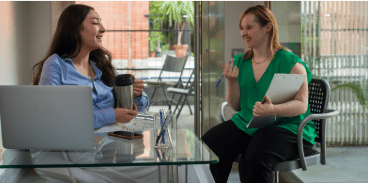We recently interviewed Paul, one of our Mental Health tutors and here is what he had to say.
Could you briefly describe your background and what led you to become a mental health tutor?
I’ve been a qualified trainer for about 20 years, and I’ve also lectured in play work and youth work at university level. I’ve also run several charities, most of which have had children’s play as their theme. Mental health is something I’ve always been interested. In my work to date that’s one of the benchmarks I look for, to see how the work I’m doing, whether it’s teaching, play work or youth work, can improve mental health, and protect against poor mental health.
How long have you been teaching mental health and wellbeing classes?
I’ve been with ACL for just under a year, teaching one and a half days a week. It’s been a fulfilling and humbling experience to work with people that have taken the step to take care of their own mental health.
What is your teaching philosophy or approach to mental health education?
I think in this day and age, people are looking for practical, simple advice. Modern life is so pressured and demands a lot from all of us. I’m there to facilitate useful conversations, to throw in an insight when it’s useful and just to create an atmosphere where people feel comfortable and leave feeling better. There’s nothing better than getting feedback on a session where people say their mood is so much more improved than when they arrived that morning. That’s an indicator that me and my co-tutor have done a good job.
What do you consider to be the most important aspects of mental health awareness?
I think the stigma of poor mental health has been slowly improving with people like David Beckham and Prince William talking openly about it. However, I still think there’s a job to be done particularly about engaging men in taking their mental health seriously.
It’s wonderful that Essex County Council offer these courses that are completely free to attend with locations all-round the county. Nothing is asked of you other than just turn up with an open mind. I think I am right in saying, we are the only county in the country that offers this kind of service, so please make the most of it Essex.
What are some of the common misconceptions about mental health that you encounter?
I think people wait too long to get help when it comes to deteriorating mental health. We will all have down days and tough moments but when it’s consistent and when we can’t see a brighter horizon, that might be the time to talk to someone and get some help.
What is the typical format of your mental health class? (e.g., lecture, discussion, group activities)
There are always two tutors. People sit around the whiteboard where we have a presentation of about maybe 20 slides. They’re mostly images with a little bit of text. Each one of the 20 slides is a talking point, where the tutors will draw stuff out from people, including ideas, tips, or situations that they’ve overcome. It’s always in a positive footing and when we take a break and it’s a very relaxed atmosphere, it’s very open and chatty. We make sure that everybody who wants to speak has a chance and it’s okay if that week you’ve decided you just want to listen. We just want you in the room. Everyone’s contribution is valued.
What topics do you cover in your class?
We cover all the typical issues that make modern life quite difficult. We have sessions on overcoming anxiety, on how to rebuild confidence, and on restoring better sleep. We have a session that looks at decluttering, because hoarding can be a big problem for some people. We’re currently developing a session on addressing experiences of bullying. All of our courses are designed to build people up and to help them find the resources they probably didn’t even know they had within them to get through a difficult time.
How do you tailor your lessons to different age groups or audiences?
Our classes are accessible to everyone we welcome one and all. Any person can walk through that door and we are prepared to do whatever it takes to make sure they can get the most out of that session.
The more diverse a group we have in the room the more interesting the conversations are. There’s always a lot of good will in the room for each other.
What strategies do you use to create a safe and supportive learning environment?
At the beginning of every lesson, we have a list of maybe 10 or 12 different points which are there to make sure that everyone feels safe and is encouraged to take part. It’s things like, listening to each other and how we don’t tolerate any discrimination. We make clear its not a counselling session and if there’s things that people want to talk about that are personal, the tutors are available at the break. We lay out quite a clear framework of how the session is going to be and it’s always an interactive process and it always seems to work out fine.
How do you incorporate personal experiences or stories into your lessons?
They just come in naturally – we don’t have a script or set pieces that we slot in at certain points. When a moment arises where a useful experience can help somebody else then that’s the point you introduce it. It happens all the time. I think it’s those personal stories that really resonate with people rather than hypotheticals. We are of course careful about confidentiality and maintaining our own privacy. There is a way you can talk about things that make it possible to share personal experiences.
What do you think are the most significant benefits of mental health awareness education?
The more people in society that have good mental health and are resilient to the stuff that life throws at us the better. It makes for stronger society. We can model modes of resilient behaviour to our children, as well as to others, so they can see we all get knocked down but you can get up as well.
I think social media can lead people to feel when they look at other peoples lives that they’re inferior or they’re not getting the most out of life or they’ve been left behind. The truth is things like social media aren’t always reality because people are just presenting a curated version of their life. I think this is an area that I’m interested in providing workshops on. We all use social media but we don’t need to be a slave to it either. It’s a about balance.
How do you measure the effectiveness of your classes?
I think people saying good things about how the workshops or classes impacted on them shows the sessions are working. The big one is when they turn up to the next session, we know they really got something out of the previous one they attended. I think that’s great, and that’s how you build up your audience. Our classes at Colchester have been running now since the beginning of 2024 and they are becoming better attended. However, there’s still room for more people to come through the door and benefit from what we’re doing, so hopefully word-of-mouth, people telling other people about their experiences will bring more people in. We’d love to be able to work with more people.
Have you received any feedback from participants about the impact of your classes on their lives?
Yes, only recently we had one guy who was really having struggles with his mental health. We had talked about the trigger cycle that can make us anxious. He learnt that you can interrupt the trigger cycle and not necessarily succumb to the anxiety. He came back the following week and he said he’d been out and about that weekend one day and was feeling rough, it wasn’t a great time for him, and then he thought ‘oh yeah the trigger cycle’. The tool we provided him with enabled him to come out of that bad moment. He said it was this that stopped him from having to go and get clinical mental health support. It was a really great moment to hear that something we had passed on to him had really had a beneficial effect and really saved the day for him.
What challenges have you encountered in teaching mental health awareness, and how have you overcome them?
In terms of the classes and the people who attend there’s never been a problem, it’s always been enjoyable and informative. The only challenge is letting people know that this service is available to them for free, every week in their local area. That’s the challenge. People are so busy and there’s so many demands on our attention that it’s hard to get that message out to them. However, we’re determined to do what we can to get the offer out there.
What do you see as the future of mental health and wellbeing education?
I have a feeling that this sort of work these sorts of workshops are staying put because they are so important to society. When your mental health is poor, everything is affected in your life, relationships, your work, ambition. It all falls down because you can’t think clearly or positively. If people knew that once a week there was a place they could go to near them where they were going to be given some really great ideas on how to lift themselves up and out of the gloom, that would be great.
What resources or tools do you recommend for people who want to learn more about mental health?
There’s lots of really good stuff online. The charity Mind has some really good resources that are worth looking at and there are many mental health focussed charities and organisations that run helplines and have lots of really good online resources. But nothing beats people getting together and supporting each other as they do at ACL sessions. The other stuff is really useful but human contact is really important.
How do you stay updated on the latest research and developments in mental health?
I think the mainstream media does a pretty good job of keeping people up to date on developments particularly on scientific and medical breakthroughs. There are some great campaigns about getting people to talk more about their mental health. The human race survived this far, so I’m sure we have the mental resilience to continue forward, and I’m determined to do my bit. It’s something we will all experience. You can learn from it and it makes you stronger.
What advice would you give to someone who is struggling with their mental health?
It’s actually very simple which is great. I would say talk to someone that you feel comfortable talking with about it. That might be a knowledgeable stranger on a hotline, it might be a friend, it might be a colleague at work, or it might also be a relative. Talk to someone. I would also say pop into ACL in Colchester and see what’s happening. I am sure when you see the programs that are available over the weeks there’ll be something in there that will really speak to you and it could be the start of something great.
How can we create a more mentally healthy society?
The way we live our lives is pressured. For some people it can really be difficult to navigate from time to time, so I think it’s just about being kind to each other, keeping an eye on each other and understanding it’s okay to ask the question of ‘are you ok’ to a colleague or family member Is there anything I can do?’
Talk to someone. Pop into ACL.




